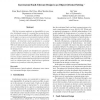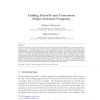37 search results - page 4 / 8 » On Differencing Object-Oriented Formal Specifications |
APAQS
2001
IEEE
13 years 11 months ago
2001
IEEE
With the increasing emphasis on dependability in complex, distributed systems, it is essential that system development can be done gradually and at different levels of detail. In ...
ENTCS
2008
13 years 7 months ago
2008
The Event-B method is a formal approach to modelling systems, using refinement. Initial specification is a high level of abstraction; detail is added in refinement steps as the de...
PDSE
1998
13 years 8 months ago
1998
The development of correct OO distributed software is a daunting task as soon as the distributed interactions are not trivial. This is due to the inherent complexity of distribute...
IEEEICCI
2002
IEEE
14 years 8 days ago
2002
IEEE
There are already many projects focusing on Computer Aided Software Engineering (CASE) tools for object-oriented analysis and design. However, at this moment, there are certain li...
ER
1995
Springer
13 years 11 months ago
1995
Springer
We describe a (meta) formalism for defining a variety of (object oriented) data models in a unified framework based on a variation of first-order logic. As specific example we use...


